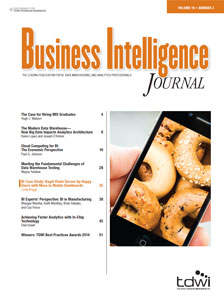
Business Intelligence Journal | Vol. 19, No. 3
TDWI Member Exclusive
September 15, 2014
Projects require resources, and today you’re likely to hear the term “allocation of
scarce resources.” In this issue, we examine resources—people, capital, hardware,
and software—whatever it takes to get the job done.
Your project will certainly need people, but as senior editor Hugh J. Watson asks,
where can you find good help these days? After examining the skills a BI analyst
needs, Watson makes the case for hiring MIS graduates, who “tend to have the
combination of technical, business, soft, and system development skills that fit
many BI positions.”
Resources also include hardware and software solutions. Karen Lopez and Joseph
D’Antoni explore how big data impacts your analytics architecture. They describe
the Hadoop framework components most relevant to the data warehouse architect
and developer. Elad Israeli shows how to efficiently use resources such as hard disks,
RAM, and CPU to enable large storage capacity and strong analytics performance.
With enterprise budgets stretched to the limit, it’s no wonder Hadoop is frequently
touted as a low-cost approach to storing and analyzing big data. Our BI Experts’
Perspective column asked Bhargav Mantha, Keith Manthey, Brian Valeyko, and
Coy Yonce to share their knowledge and recommendations about big data projects.
If you don’t have the budget for all the BI hardware and software you’d like, BI in
the cloud might be a viable alternative. Paul G. Johnson examines the “compelling
economic advantages” of the cloud that benefit both enterprises and society as a
whole. He offers a framework to help you evaluate the costs and benefits of transitioning
to the cloud.
Of course, before you put any project into production, you need to test it
thoroughly. That can eat up resources. Wayne Yaddow presents three challenges
enterprises face in testing their data warehouse projects and suggests best practices
and test methodologies to maximize your efficiency (and thus conserve resources).
You may also be able to save money by moving to mobile computing. Our case
study takes a closer look at the success Einstein Noah Restaurant Group realized
when it moved managers from Excel to mobile dashboards.
With the right resources, enterprises can do great things, as evidenced by the 10
winners of this year’s TDWI Best Practices Awards. The full list of outstanding
enterprises and their projects begins on page 51.
As always, we welcome your comments. Please send them to [email protected].
James E. Powell
Editorial Director
Business Intelligence Journal
IN THIS ISSUE
- The Case for Hiring MIS Graduates
Hugh J. Watson
- The Modern Data Warehouse—How Big Data Impacts Analytics Architecture
Karen Lopez and Joseph D’Antoni
- Cloud Computing for BI: The Economic Perspective
Paul G. Johnson
- Meeting the Fundamental Challenges of Data Warehouse Testing
Wayne Yaddow
- BI Case Study: Bagel Chain Serves Up Happy
Users with Move to Mobile Dashboards
Linda Briggs
- BI Experts’ Perspective: BI in Manufacturing
Bhargav Mantha, Keith Manthey, Brian Valeyko, and Coy Yonce
- Achieving Faster Analytics with In-Chip Technology
Elad Israeli
- Winners: TDWI Best Practices Awards 2014